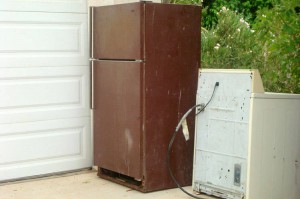 The horrifying death of a child trapped in an abandoned refrigerator was the motivation behind a story by the Channel 5 news in Rio Grande Valley, Texas.
The horrifying death of a child trapped in an abandoned refrigerator was the motivation behind a story by the Channel 5 news in Rio Grande Valley, Texas.
The station reported finding numerous refrigerators abandoned in people’s yards. This is certainly a danger and without question should be addressed as a public safety hazard, but the investigation states that “it’s against federal law to have such an appliance just sitting around.”
I was curious about this federal law called The Refrigerator Safety Act and looked into it myself. What I found is this:
{SEC. 1.} [15 U.S.C. 1211]
It shall be unlawful for any person to introduce or deliver
for introduction into interstate commerce any household
refrigerator manufactured on or after the date this section takes
effect unless it is equipped with a device, enabling the door
there of to be opened from the inside, which conforms with
standards prescribed pursuant to section 3.
The law was to become effective after the various standards were defined, all of which followed the Refrigerator Safety Act’s publication date of August 2, 1956. This also appears to be misunderstood in the news story.
The local station also reported that “The law says that if you’re going to keep a refrigerator around, the doors and locks must be removed.”
I could find nothing that requires the owner to alter their appliance. The manufacturer is required to make it possible to open it from inside, preventing entrapment. I don’t think a panicked, trapped child (or adult) will be able to find the release mechanism and get out. The concept is good, but in practice, I don’t think it will work. Removing the doors is a great idea, it just doesn’t appear to be legally required.
Please don’t misunderstand me – I have taped, tied and locked my empty freezer before turning it to the wall and locking it in the garage away from all children and animals. I take the safety of others very seriously, I just couldn’t find the federal law that could fine me if I didn’t take government mandated precautions. I don’t have a solution or an answer to what should or shouldn’t be governed; I’ll try to do what I believe to be right to protect others, but I like to be clear about laws.
Take a look at the law here, and see if my reading comprehension needs improving. In the meantime, please, don’t leave any appliance large enough to contain a living breathing, creature out where it will be a hazard- federal law or not.